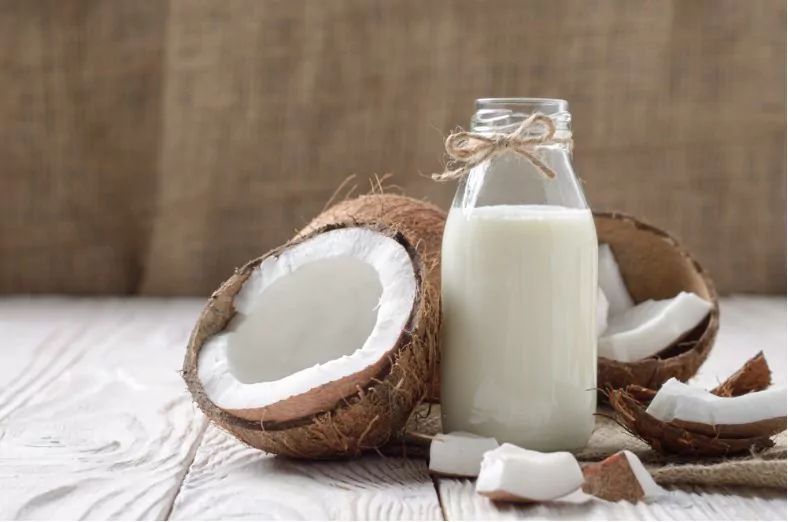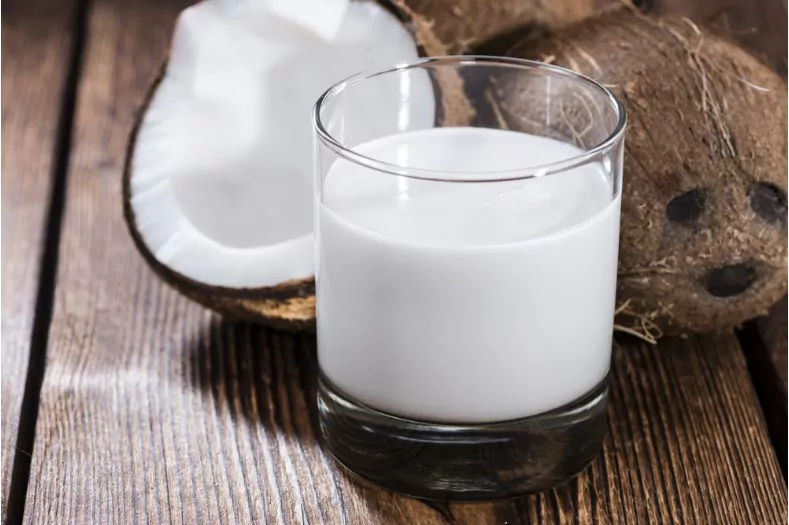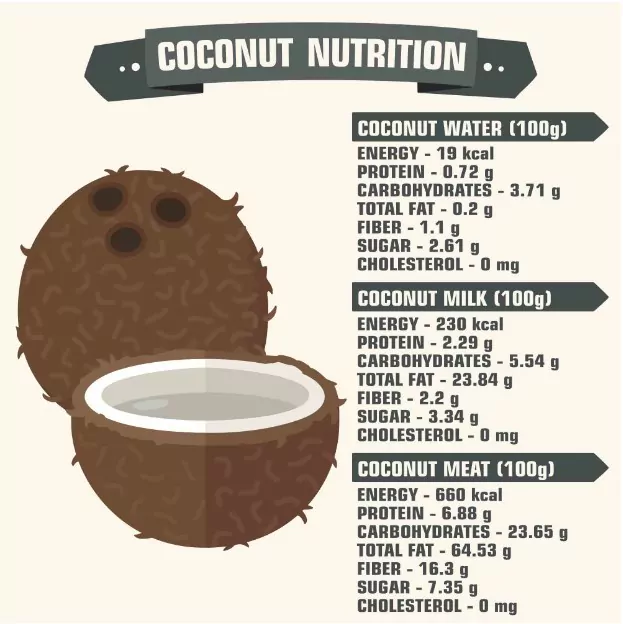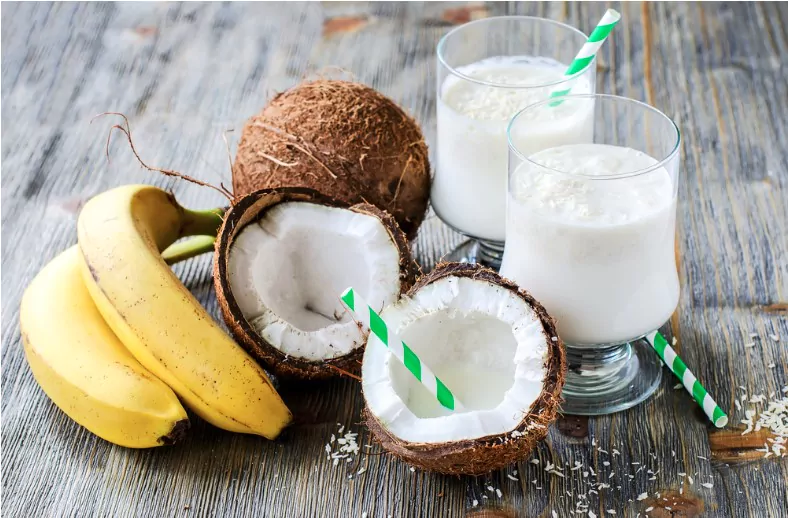Natural Wellness: Benefits of Coconut Milk

The tropical coconut tree is an amazing gift from nature. From the trunk to the leaves, each part has its uses. But one of its most delightful yields is coconut milk. Today, we’ll delve deep into the world of coconut milk: its benefits, nutritional value[1], and how it fits into a balanced diet, especially when people ponder if it’s good to drink coconut milk regularly.
- What is Coconut Milk?
- Nutritional Profile of Coconut Milk
- Unveiling the Health Benefits of Coconut Milk
- Coconut Milk Vs. Other Fats
- Coconut Milk Vs. Other Oils and Milk
- Incorporating Coconut Milk into Your Diet
- Potential Pitfalls to Watch Out For
- Storing Coconut Milk
- How to Incorporate Coconut Milk in Your Diet?
- Wrapping Up
1 What is Coconut Milk?

When you grate the flesh of mature brown coconuts and mix it with hot water, you end up with a rich, creamy liquid called coconut milk. This creamy liquid is often mistaken for coconut cream due to its thick consistency, but they differ in richness and fat content. Also, it’s essential not to confuse coconut milk with coconut water, the clear fluid inside young coconuts. Depending on the consistency, coconut milk can be categorized into two types: thick and thin.
Depending on the consistency, coconut milk can be categorized into two types:
- Thick Coconut Milk: It’s made by directly squeezing grated coconut, yielding thick milk.
- Thin Coconut Milk: After squeezing the thick milk, if the remaining liquid is squeezed once more after adding more water, the result is thinner milk.
2 Nutritional Profile of Coconut Milk
At the heart of understanding the coconut milk benefits is comprehending its nutritional content. Coconut milk is renowned for its saturated fat content. High in saturated fats, especially medium chain triglycerides (MCTs) and lauric acid, coconut milk is unlike most other fats. Medium-chain fatty acids (MCFAs) are processed differently in the body compared to long-chain fatty acids. They head straight to the liver where they may be converted into energy, promoting weight loss and providing a quick energy source.
A half a cup of unsweetened coconut milk (from a can) contains

- Energy: 230 kcal
- Fat: 24g
- Protein: 2.29 g
- Carbohydrates: 5.54 g
- Fiber: 2.2 g
- Sugar: 3.34 g
- Cholesterol: 0 mg
- Vitamin C, Vitamin D, and Iron
Coconut milk’s high-calorie content might lead one to think it could promote weight gain, but it’s more complex than that. Its caloric nature comes from its fat content, specifically the healthy saturated fats, which might help regulate weight in various ways.
3 Unveiling the Health Benefits of Coconut Milk
The primary question most people have is, “Is coconut milk good?” The answer lies in its rich nutritional value. Coconut milk offers a healthier fat source than some alternatives. The saturated fat in coconut milk, primarily lauric acid, supports a healthy immune system. It’s anti-inflammatory and has been linked to various health benefits.
Moreover, for those who can’t consume dairy milk due to lactose intolerance or tree nut allergy, coconut milk stands as an excellent alternative.
Rich Nutritional Value
Coconut milk contains an array of vitamins and minerals. While it’s a high-calorie food due to its fat content, it’s also rich in vitamin C, vitamin D, and a slew of minerals.
Healthy Fats
The primary fat in coconut milk is lauric acid, a medium-chain fatty acid (MCFA). Unlike long-chain fatty acids found in other saturated fats, MCFAs are easily digested and might promote weight loss.
Supports a Healthy Immune System
Lauric acid is believed to support a healthy immune system. It has anti-inflammatory properties and has been linked to various health benefits.
Dairy Alternative
For those who are lactose intolerant or have a tree nut allergy, coconut milk stands out as a fantastic milk substitute. It’s one of the sought-after plant-based alternatives, next to almond and rice milk.
Supports Weight Management
While coconut milk is calorie-dense, it might promote weight loss when consumed in moderation. Its MCFAs can help in maintaining body weight. However, excessive consumption may lead to weight gain, so it’s essential to strike a balance.
Hair and Skin Benefits
With its rich consistency and nutrients, coconut milk has found its place in hair treatments and skincare routines. It nourishes the scalp and adds shine to hair, while also serving as a moisturizing agent for the skin.

4 Coconut Milk Vs. Other Fats
Coconut milk contains saturated fats. While saturated fats have often been frowned upon due to potential links with bad cholesterol, not all saturated fats behave the same way.
For instance, the fatty acids in coconut milk, primarily lauric acid, are medium-chain triglycerides (MCTs). These differ significantly from the saturated fats found in animal products. MCTs are metabolized differently and might be beneficial for weight management.
On the flip side, olive oil contains unsaturated fats, which are heart-healthy and recommended for consumption. However, when considering dairy alternatives, especially for those allergic to tree nuts, coconut milk is a contender alongside almond milk.
5 Coconut Milk Vs. Other Oils and Milk
While olive oil has its own set of benefits, coconut oil and the milk derived from it have a unique set of medium-chain fatty acids. Moreover, when pitted against almond milk, rice milk, and other plant-based milk alternatives, coconut milk offers a richer texture and a distinct flavor. However, unlike coconut water, which is low in calories, coconut milk is denser due to its fat content.
6 Incorporating Coconut Milk into Your Diet

Unsweetened coconut milk is a versatile ingredient. From drinking coconut milk directly to savouring coconut milk porridge for breakfast, the possibilities are endless.
- Coconut Milk Drinks: While drinking coconut milk directly is an experience in itself, you can enhance it by creating smoothies or even coconut milk-based coffee.
- Cooking: Add coconut milk to curries for a rich flavor. Whether it’s thick coconut milk for desserts or thin coconut milk for soups, it’s a culinary delight.
- Baking: Unsweetened shredded coconut or coconut milk can be added to baked goods for a tropical twist.
7 Potential Pitfalls to Watch Out For
While coconut milk is nutritious, consuming it in moderation is essential. Being a calorie-dense food, excessive intake could lead to unhealthy weight gain. Always ensure you’re balancing your diet, maybe by complementing it with high-protein foods.
Also, while some people thrive on a coconut-rich diet, others, especially those on a carbohydrate-rich diet, might want to be more cautious with their coconut milk intake to prevent weight gain.
8 Storing Coconut Milk

If you have your own coconut milk made from fresh coconut, it’s best consumed fresh. However, if storing, refrigerate it and use it within a couple of days. Canned coconut milk has a longer shelf life, but once opened, it follows the same principle as fresh coconut milk.
9 How to Incorporate Coconut Milk in Your Diet?
You can add coconut milk to a myriad of recipes. One popular method is making coconut milk porridge for breakfast. Drinking coconut milk is also popular, with various coconut milk drinks flooding the market. Moreover, for those looking to amp up their culinary skills, adding coconut milk to curries, soups, and desserts can elevate the dish’s flavor and texture.
10 Wrapping Up
While coconut milk may be a boon for many, especially those seeking dairy alternatives like almond or rice milk, it’s essential to be mindful of its calorie content. As with all foods, moderation is key.
The health benefits of coconut in its various forms, be it coconut oil, water, or milk, are vast. Its lauric acid content, anti-inflammatory properties, and nutritional value make it a worthy addition to our diet.
Incorporating healthy coconut milk recipes, understanding coconut milk nutrition, and contrasting it with other fats like olive oil can guide you in making informed dietary choices.
From the lush coconut trees in tropical paradises to our dining tables, coconut milk has made a journey, proving its worth time and again. Cheers to a healthier, coconut-infused life!
Community Q&A
References
-
1.
Asiri N. Karunasiri, Mahendra Gunawardane, Chathuri M. Senanayake, Nimanthi Jayathilaka, and Kapila N. Seneviratne: Antioxidant and Nutritional Properties of Domestic and Commercial Coconut Milk Preparations. - Retrieved on August 1, 2020
About This Article
This article has been viewed 228 times.



